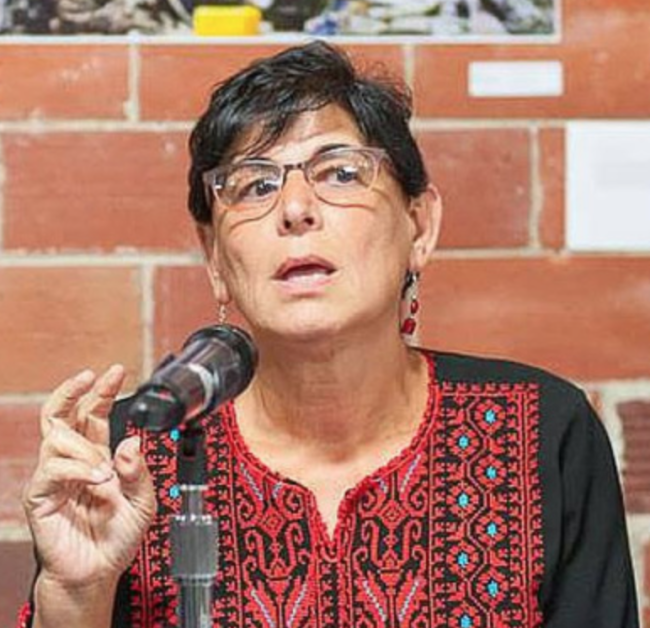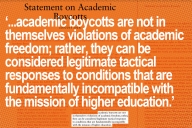You have /5 articles left.
Sign up for a free account or log in.

Rabab Abdulhadi
San Francisco State University
San Francisco State University hired Rabab Abdulhadi away from the University of Michigan at Dearborn, where she’d served as the director of the Center for Arab American Studies, in 2006. Abdulhadi’s memorandum of understanding from SFSU from the time promises, among other things, that the university “will support two additional lines in the areas of Arab-Islamic studies,” to be opened as research faculty associates and “converted to tenure track faculty lines at a later time to be determined by the academic needs as you assess them.”
Well over a decade later, those promised faculty lines still haven’t materialized. Two tenure-track searches were authorized in 2009, suspended amid budget concerns and never reinstated.
Abdulhadi is still the university’s lone professor of Arab and Muslim ethnicities and diasporas (AMED), even though she was hired to build a program “that will be a model for the field.”
'Bait-and-Switch'
Abdulhadi sued the university over this and other issues in 2018, alleging breach of contract and discrimination based on her Palestinian Muslim background, along with general bias against her pro-Palestinian activism. The remaining claims in the case were dismissed this month.
Abdulhadi found more success in grieving the case internally through her faculty union: a three-person faculty panel unanimously sided with her in February, finding that the breach-of-contract claim regarding the two faculty lines was a “serious” grievance “requiring an immediate remedy.” Regarding Abdulhadi’s claim of a hostile work environment, the faculty panel found that the lack of hires for her program “resulted in intellectual isolation,” with “negative consequences in terms of her building an AMED program.”
The professor also alleged breach of contract regarding being required to teach introductory courses in the race and resistance studies department, where AMED is housed, but the panel found no evidence to rethink that arrangement for now.
But if Abdulhadi’s program had promptly added two new faculty members, as promised, “these hires would be associate or full professors by this time," the faculty panel concluded. "We ask SFSU to hire two new faculty members in AMED and that at least one hire is at the associate or full level.”
Additionally, SFSU “should issue an apology to Dr. Abdulhadi for not fulfilling the promise made to her upon her hire and for years of denying the requests for the faculty hires.”
Far from apologizing, SFSU this month rejected the faculty hearing committee report. A formal response, prepared by Ingrid Williams, assistant vice president for human resources, says that Abdulhadi didn’t report the alleged contractual violation within the required 42-day period from when she noticed it, even though faculty panel found that to be an inappropriate time window for this kind of breach.
More significantly, Williams asserted that Abdulhadi’s MOU isn’t enforceable, because the California Faculty Association’s collective bargaining agreement expressly provides that it “constitutes the entire agreement” between the parties and that it “supersedes all previous agreement, understandings, policies and prior practices directly related to matters included" in the CBA.
SFSU, via Williams, assigned specific blame to the former dean of the College of Ethnic Studies, Kenneth Monteiro, who hired Abdulhadi, suggesting he went rogue when he brought her on board.
“Monteiro did not have the authority to bind the university or circumvent the CBA,” Williams wrote. “Appointments and other official notification to an employee must be made by the president. [Former president Robert A. Corrigan] did not delegate his presidential authority to the dean on this matter nor other matters within his delegation. Furthermore, the president is not copied on said MOU; thereby possibly having no knowledge that this MOU existed.”
Abdulhadi said this week that if she’d known she couldn’t trust an official university document, she never would have left Dearborn, where she enjoyed university support. She said SFSU’s actions toward her are evidence of SFSU’s “bait-and-switch modus operandi,” in which “the administration lures scholars to campus only to change the terms after they get there and claim that their contracts are not enforceable. It is dishonest and unethical, as well as violating labor laws and fair employment conditions.”
Monteiro, Abdulhadi’s former dean, said that the notion that he was some “renegade dean” was a "total lie” and that SFSU appeared to be playing a “language game” as to what “authority” means.
“The promise was made on behalf of the institution, under my signature, with the full authority vested in me by the provost and the president to make that promise,” Monteiro said, adding that negotiating the MOU took “weeks” because every time he and Abdulhadi agreed on a line or two, he had to seek approval from above.
If the university “does not want to keep that promise, it has the right to say it’s not going to—and it should just do that," he said.
Not the First Time
Abdulhadi certainly isn’t the first professor to accuse SFSU of promising them certain perks or working conditions—which is typical in the recruitment of tenured scholars—and then failing to deliver. Four others have done so in recent years. In at least three of those other cases—like Abdulhadi’s—the affected professors said new administrators blamed various deans for overpromising. In some cases, the MOUs were followed for a time and then suddenly ignored.
Marc Stein, Jamie and Phyllis Pasker Professor of History at SFSU, who was recruited from York University, in Canada, has accused the university of failing to honor relocation reimbursement and research leave promises as they were originally negotiated. He said recently that he not only disagreed with the university’s legal analyses in these cases (the terms of a union contract represent the floor for negotiations with incoming professors, not the ceiling, for instance, Stein argued), but also with SFSU’s apparent way of doing business.
“How is an outsider supposed to know that this process can’t be trusted, that some administrator might later take issue with the terms [of a hiring agreement]?” he asked. “There’s a weird way in which they seem to be assuming that external job candidates have internal knowledge of the institution’s idiosyncrasies. And that’s just so, so untenable.”
Similar to Monteiro, Stein said that if SFSU really stands behind not honoring agreements, “Let them proudly and transparently announce that to the world. If they did that, then people like me could not then later say, ‘Oh, you deceived me.’ But of course, no university is going to do that. It’s a ridiculous position and they would lose candidates.”
Maureen Loughran, a representative of the systemwide faculty union who helped with Abdulhadi’s grievance, said not honoring hiring agreements when new provosts and presidents come along “clearly shows managerial and university administration dysfunction. When you don’t authorize those doing the hiring to make deals, or say, ‘Sorry, that dean is no longer here,’ or, ‘The president didn’t know, and now we’re taking this away from you,’ well, that’s not a good way to run a university. Managerial incompetence at its highest level.”
In addition to sharing the university’s response to Abdulhadi’s grievance, Bobby King, university spokesperson, said that SFSU “and the provost follow best practices by prioritizing student enrollment and demand when considering faculty positions. Using those criteria, it was determined that AMED’s current enrollments do not justify additional faculty hiring at this time.”
The university used this enrollments argument during the grievance process, but the faculty panel was not persuaded. The panel’s report says that “throughout the hearing, we learned that there have been zero faculty hires in AMED between 2009 and 2020. Yet, there have been at least 10 new faculty hires in ethnic studies. At the same time, we saw attempts by Dr. Abdulhadi to ask the administration for the faculty hires promised to her.”
With changes in SFSU's administration, Abdulhadi “was presented with new and different requirements to hire in AMED,” the panel said, citing hearing testimony from the current ethnic studies dean that the former provost prioritized hiring only if a position had been vacated, while the current provost prioritizes hires based on student enrollment. “Neither of these conditions is relevant concerning the two hires stated [in the] MOU Dr. Abdulhadi received from former Dean Monteiro.”
Based on the faculty collective bargaining agreement, Abdulhadi has one last option: request binding arbitration.
Abdulhadi said that the university should now, at minimum, reinstate in the forthcoming budget two tenure-track hires at the associate or full professor level, “so they can work with me to turn the program into the department that I was promised when I was hired and not be encumbered by having to run through hoops placed on junior faculty by an administration that seeks to dismantle the program.”
In the interim, Abdulhadi said she needs an operating budget and help with the various roles she’s playing as a “one-person program”: teaching a full load of six courses per year, advising three student groups for Palestinian and Muslim students, and running a film series, open classrooms project and study abroad and scholarship programs. Abdulhadi said she also assists with a collaboration between the Palestinian An-Najah National University and SFSU.
A Bigger Picture
Beyond a pattern of reneging on agreements, Abdulhadi said SFSU has a “long history” of suppressing Palestinian voices, and that programs like hers face a “prevailing Islamophobia and anti-Arab and anti-Palestinian mind-set.”
Ironically, she said, this mind-set is “difficult to shake unless there is institutional support for a curriculum, such as the program I was recruited to build and direct.”
Monteiro, Abdulhadi’s semiretired former dean, struggled against what he called chronic underfunding for ethnic studies in general while he led the college, which is the nation’s first and only freestanding college dedicated to ethnic studies. He said that the college’s problems, including Abdulhadi’s, are part of a larger “backlash,” one that is “anti-Black and anti–people of color. It’s a constant; it’s just the intensity that goes up and down.”
He continued, “The attack usually starts with the Black people and with Black studies, which is now Africana studies. But in the last 10 years, anti-Palestinian studies has been an easier target.” (Monteiro said he also acknowledged that SFSU administrators face unique pressures in balancing the needs and interests of local Arab, Muslim and Jewish communities, and that he himself met with representatives from these internally diverse groups during his time as dean.)
Abdulhadi may be an especially easy target, as she’s a controversial figure in an already controversial field. She was accused by Jewish students of promoting anti-Semitism, including in disrupting a 2016 campus visit by the then mayor of Jerusalem, Nir Barkat, for instance. That 2017 lawsuit, which also singled out Monteiro for criticism, was dismissed (ultimately by the plaintiffs themselves on appeal) as failing to allege a violation of federal discrimination law.
More recently, in 2020, Abdulhadi helped plan a virtual roundtable discussion on Palestinian rights, gender and resistance with Leila Khaled, one of two terrorists who hijacked TWA flight 840 from Italy to Israel in 1969, in affiliation with the Popular Front for the Liberation of Palestine. The event proved too controversial for Zoom, which refused to host the roundtable, along with YouTube, which pulled a livestream of the event, and Facebook, which took down promotional materials.
Regarding the Khaled panel, Abdulhadi filed a separate internal grievance alleging that SFSU should have offered more support for the event, in the name of academic freedom. A faculty panel also sided with her in that case. King, the university spokesperson, said last week that when external companies deplatformed Abdulhadi’s event, “the administration repeatedly voiced objections and communicated with counsel and the companies” and made various public statements describing the university as a place where all have an opportunity to be speak and be heard. However, King said, “we were unable to prevent the removal of the class from all online platforms where it could be held.”
Stein, the fellow professor, said that while Abdulhadi has a certain history on campus, he couldn’t shake the idea that three of the contractual violation cases, including Abdulhadi's and his own, involved scholars in historically marginalized fields, namely queer and Palestinian studies.
“In all three cases, we were tenured professors recruited from research-intensive institutions, only to find that SFSU would not honor the terms of our hiring agreement.”









